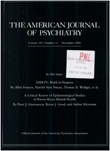The right to refuse treatment with antipsychotic medications: retrospect and prospect
Abstract
The right to refuse antipsychotic medication is now more than a decade old. Its evolution has taken divergent forms, driven either by the needs of patients' treatment or the mandate of patients' rights. Regardless of the model employed, refusal is not uncommon, but refusing patients appear almost always to receive treatment in the end. These findings point up the essential illogic of allowing committed persons to refuse treatment that would permit their freedom to be restored. The future evolution of the right may proceed differently in federal and state courts, but whether at the level of legal theory or actual practice, some accommodation will restore the equivalence between the power to commit and the power to treat.
Access content
To read the fulltext, please use one of the options below to sign in or purchase access.- Personal login
- Institutional Login
- Sign in via OpenAthens
- Register for access
-
Please login/register if you wish to pair your device and check access availability.
Not a subscriber?
PsychiatryOnline subscription options offer access to the DSM-5 library, books, journals, CME, and patient resources. This all-in-one virtual library provides psychiatrists and mental health professionals with key resources for diagnosis, treatment, research, and professional development.
Need more help? PsychiatryOnline Customer Service may be reached by emailing [email protected] or by calling 800-368-5777 (in the U.S.) or 703-907-7322 (outside the U.S.).



